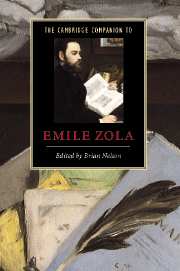Book contents
- Frontmatter
- 1 Zola and the nineteenth century
- 2 Family histories and family plots
- 3 Zola and the representation of society
- 4 Questions of sexuality and gender
- 5 Zola and contemporary painting
- 6 Zola and the art of fiction
- 7 Thérèse Raquin: animal passion and the brutality of reading
- 8 Nana: the world, the flesh and the devil
- 9 Germinal: the gathering storm
- 10 La Bête humaine: Zola and the poetics of the unconscious
- 11 Zola’s utopias
- 12 ‘J’accuse...!’: Zola and the Dreyfus Affair
- Further reading
- Index
8 - Nana: the world, the flesh and the devil
Published online by Cambridge University Press: 28 May 2007
- Frontmatter
- 1 Zola and the nineteenth century
- 2 Family histories and family plots
- 3 Zola and the representation of society
- 4 Questions of sexuality and gender
- 5 Zola and contemporary painting
- 6 Zola and the art of fiction
- 7 Thérèse Raquin: animal passion and the brutality of reading
- 8 Nana: the world, the flesh and the devil
- 9 Germinal: the gathering storm
- 10 La Bête humaine: Zola and the poetics of the unconscious
- 11 Zola’s utopias
- 12 ‘J’accuse...!’: Zola and the Dreyfus Affair
- Further reading
- Index
Summary
When Nana, the ninth volume in the Rougon-Macquart cycle, was published in 1880, it provoked a great deal of condemnation for its bold portrayal of sexuality. It also provoked intense interest and fascination, often for the same reason, selling 55,000 copies almost at once, and during Zola's lifetime outselling all his novels except La Débâcle. It would later become the subject of a number of films, of varying degrees of fidelity to the novel. Zola's alluring and terrifying heroine shares many characteristics of the maneating Monster-Woman of decadent nineteenth-century fiction, but she is a far more complex character who, as a symbol of the Second Empire, also embodies a social and political theme.
'Un sacré coup d'aile'
At the same time as he was writing Nana, Zola was writing his Roman expérimental defending the 'naturalist', quasi-scientific stance, but, carried by what Huysmans admiringly termed 'a tremendous winged thrust' ['un sacre coup d'aile' (1694)], the novel goes far beyond the naturalist 'method'. In his planning notes Zola had described the subject of this novel as 'a whole society chasing after sex. A pack of hounds following a bitch . . . The poem of male desire' ['toute une société se ruant sur le cul. Une meute derrière une chienne . . . Le poème des désirs du mâle' (1669)] - hardly the objective view of the detached observer as promulgated in naturalist theory!
- Type
- Chapter
- Information
- The Cambridge Companion to Zola , pp. 121 - 136Publisher: Cambridge University PressPrint publication year: 2007
- 1
- Cited by



